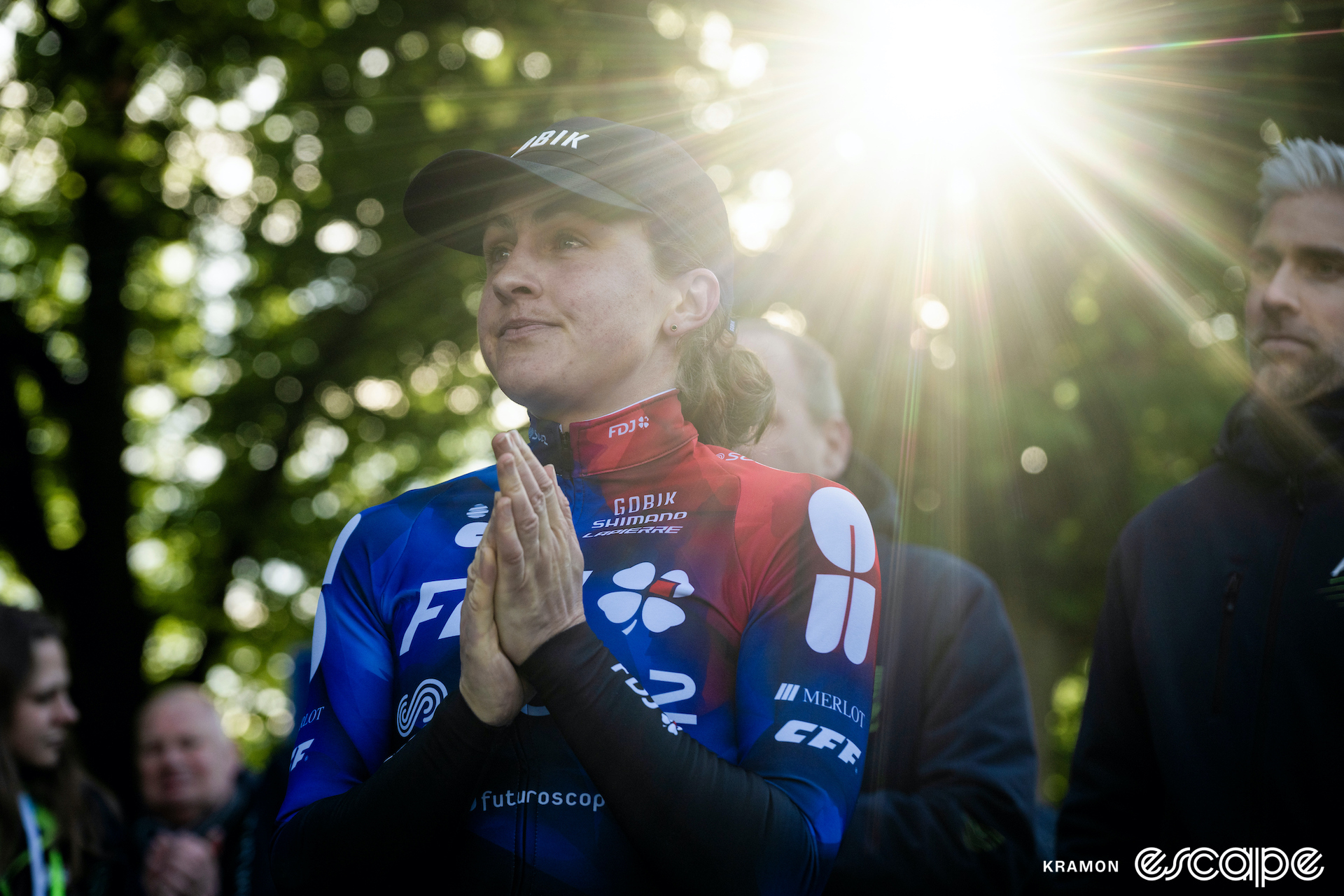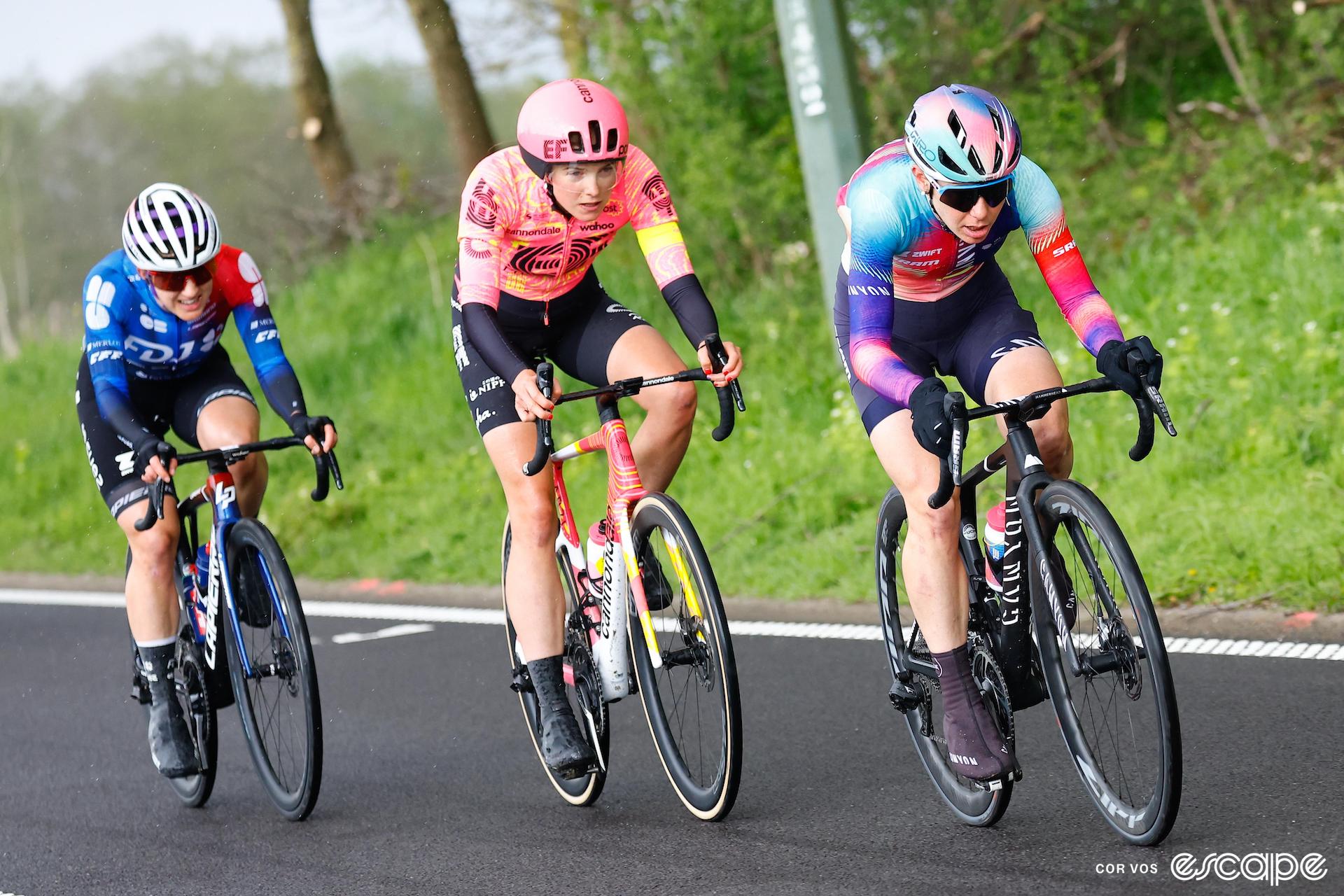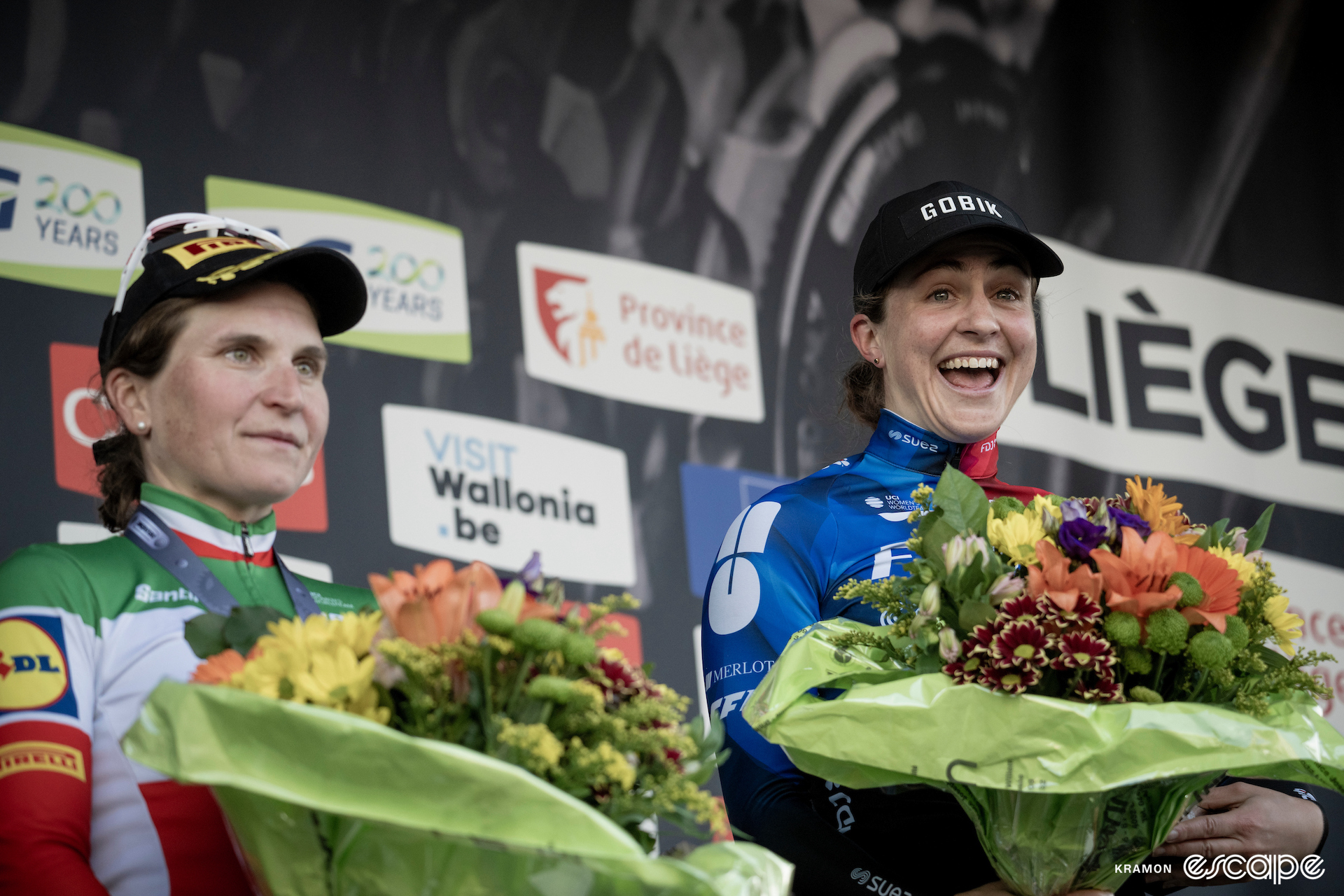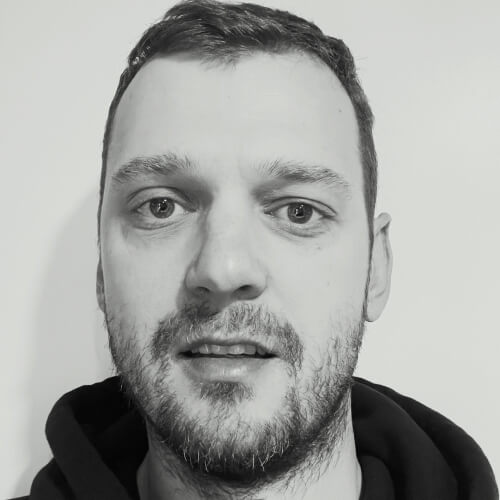Last Sunday afternoon, Australia’s Grace Brown (FDJ-Suez) took the biggest win of her career at Liège-Bastogne-Liège Femmes. After two runner-up finishes at the Belgian ‘Monument’, Brown turned a strong ride in the day’s main breakaway into victory with a well-timed sprint from an elite lead group.
A few days after that victory, Brown caught up with Escape Collective via phone to talk through her big win and its significance in the context of her season. This interview has been lightly edited for fluency.
***
Matt de Neef: What’s the last few days been like for you?
Grace Brown: Quite a continued buzz. It’s a win like none that I’ve had before. Usually you have a real sense of accomplishment and high but it feels like something extra special this one, for so many reasons. So, yeah, it’s been carrying on for a few days.
MdN: Did you get a chance to celebrate with the team? And if so, what did that look like?
GB: Yeah, very briefly, because being the last race in Belgium, everyone already had travel plans to get back home. So it was quite an operation after the race. But yeah, I had at least a moment with everyone on the team, from riders to staff, to share the victory.
Some it was just at the finish line. Podium and antidoping and press conference take a while so by the time I was back at the bus, it was just a group of staff. But we had some champagne and had a nice little celebration before we packed up and hit the road. So even though it was brief, I felt like we managed to savour the moment.
MdN: I think it’s the nature of the sport that you’re always looking ahead to the next thing, the next race. How do you go about stopping for a moment and really appreciating a win like this?
GB: The last couple of days I had stuff that was on my to-do list that I’ve just put down the priority list now. Because I felt like it’s worth soaking it up and I know that these times don’t last forever. So on the day, you have to really appreciate it. I’ve just been calling with friends and family and everyone was excited about it and talking about it, reliving it. So yeah, just enjoying that.

MdN: How transformative is this win for the way that you look back at your spring?
GB: It completely turns it around. If I just had another mediocre race at Liège I would be feeling quite flat now, and like there was no success in my Classics campaign. I would take winning Liège over having multiple top-10 results or whatever. The one day of brilliance versus consistency – I’m definitely claiming that one. *laughs*
MdN: You said on Instagram that it felt like in the Ardennes week that you really started to feel like yourself again and back to your best form. How did you get that sense? Is it simply from numbers? Is it on feel? Was it a combination of things?
GB: Yeah, it’s a bit of a combination. At Amstel [Gold Race] I already felt good but just how the race was with the neutralisation and shortened it was like super-hectic and despite feeling physically good, I just couldn’t get into the flow of the race to do anything meaningful.
And then I wasn’t meant to race Flèche but I came in to replace a teammate who had crashed at Amstel and I’m actually quite thankful that I got to race there because it was like the next stepping stone. I felt strong, I was able to attack, I rode away with [Pauliena] Rooijakkers, we were ahead of the bunch. It’s not a race that I see myself winning ever because it’s so specific but I was really able to be in the race and then do a really good lead-out for my teammate Evita [Muzic]. I just felt satisfied.
Then the day before Liège, I always just do a few openers and sort of get the body ready to race again and I just felt like I was floating on my bike the day before Liège. I just had this sense that “OK, Liège is going to be good.” I think it helps that I’ve had a history with the race and been second there twice. That gives you that extra mental confidence that I know that I can play this race. So yeah, it’s a bit of everything.
MdN: The early kilometres where you got into that move that got up the road – that was all before the TV coverage started. How did that happen and what was that like for you?
GB: Yeah, it’s quite a difficult part of the race. It’s probably the first key section. There’s the first 50 km, it’s up and down, there’s a few climbs but nothing significant, and then we have this bunch of steep climbs, narrow, twisty descents, and it’s just like one after the other, like boom boom boom.
In other years there’s quite often been a strong breakaway that gets away in this section so we wanted to be really prepared for that. And I basically almost rode the front for 15 km to be there when that break went. Lucinda Brand attacked at the top of one climb. Not a really massive attack or anything but it was just enough to split a group of us off the front. And then by the time Radio Tour caught up with what was happening we already had a minute on the peloton.
It was a really good group. There were some girls in there that weren’t working so much – like Mischa Bredewold was sitting on, Lucinda was sitting on a bit – but most of the group was motivated other than that.

MdN: What were you thinking once you got in that lead group? Were you planning to attack late, or were you backing yourself in a sprint from early on?
GB: I think if that group, that whole breakaway group [of nine] had got to the finish, yeah, I think I still would have been fairly confident for a sprint there. But in my mind, my plan for being in the breakaway was “OK, I don’t want to do too much work here. I want to take it as a bit of a free ride up the road.” In the end, it’s never a free ride. It was actually quite hard work. Even just pulling through you had to put some power down because everyone was going fairly hard. And just with the terrain, it’s just not easy, ever, in Liège.
The first objective was to get over the [Côte de] La Redoute. And then once we were over there, a group of three then, and still had a decent gap, then I was like “OK, make it to the top of [the Côte de] La Roche aux Faucons and hopefully not get caught and overtaken by the climbers.” It all just sort of worked out perfectly. The climbing was finished by the time we got caught. And then it was just thinking about holding it all together for the sprint in the end.
MdN: That moment where you locked up your brakes with 7 km to go, what was that like in that moment? Watching it live it seemed like you were very calm and you handled it really well. Was that how you felt in the moment?
GB: Ah, yeah, surprisingly calm. At the split second where you see the ground coming towards you, and you’re on your front wheel, you think “Shit. If I stack this, then I’m really out.” But the fact that I didn’t actually crash … I had to unclip and get going again, and obviously a big gap opened up, but yeah, I don’t know. I was just like, “OK, I just need to now focus on getting back in.” I just took one thing at a time.
MdN: How do you measure a chase like that, knowing that you want to save something for the sprint?
GB: I didn’t. I wasn’t saving anything for the sprint while I was chasing back. It was like “Well, maybe I won’t be able to win the sprint if I chase back but maybe I can still get on the podium. But if I don’t, then I’m coming sixth.”
I think it’s just one of my attitudes of racing – you have to keep yourself in the race. If the race goes up the road, it’s over. So yeah, first think about actually being in the race. And then, when you’re there, you can think about how to win it.
MdN: I’m curious to hear your perspective of the sprint. You timed it so brilliantly, but you had to do a lot of work to close a gap, and it looked like you almost sprinted twice – once to get on, then you sat down briefly, before going again …
GB: Yeah, the last 2 km was quite chaotic because there were attacks. You have to sort of gamble with some of them. You don’t want to be the idiot that jumps on every single attack and has nothing left for the sprint. I tried to be selective in what I chased.
The last attack from Kasia [Niewiadoma] – Kim Cadzow went out after it but didn’t have the same power to chase it down. Eventually [Elisa] Longo Borghini had to cover that one. I was sitting behind Cadzow – she was holding her pace; the gap wasn’t opening up. So I was sitting there thinking “I can’t enter that no-man’s-land until I’m at a certain distance from the finish line.” So I just sat there hoping that she would keep going, and she did.
And then yeah, around 200 metres to go I was like, “OK, this is as late as I can leave it with this gap.” And so opened up and it was almost exactly the same time that Kasia and Longo Borghini started sprinting. I just sort of managed to get into the slipstream and then started trying to come around.
It’s hard to go back into that moment when I sat down, whether it was tired legs, or I don’t know. Even in my brain it was like “This race is so big, is it mine to win?” And then I just got up again. I was like “Yeah, I’ve got more. I can do this.” And I had that second kick. I couldn’t believe that I’d won the race. It just felt surreal in the moment.
MdN: From the TV coverage it looked like you yelled out “oh my god!” as you crossed the line. Can you talk a bit more about what that moment was like?
GB: It just felt like a fairy tale. It’s just such a big race after a period of not being anywhere near my best. And being in that company, and just getting it right. I’ve won races before but I don’t think I’ve ever screamed as I crossed the line. The emotion was just so raw and real. Super epic.
MdN: What’s next for you?
GB: I’m off to the Vuelta. Eight days of racing in Spain.
MdN: Looking toward the Vuelta, and to the time trial at the Paris Olympics, does a win like Sunday give you confidence going forward?
GB: Yeah, I think it validates my goals. I’ve had these big goals, but when you’re just feeling a bit off … even though it’s different racing – road racing to time trial – it just puts a seed of doubt there. And I think also for the Olympics, it’s not just the time trial. There is the road race there and if I’m on the team, I want to be on the team not just for the time trial and taking up a spot in the road race. I want to also be valuable in that road race.
So yeah, one of my goals at the start of the season was I want some good results in the spring, because the Olympic road race is a Classics-style race. So I wanted a good result in spring that sort of justified being on the startline for the Olympic road race as well.
MdN: So after the Vuelta, what does your prep look like between then and Paris?
GB: May is a bit quieter. I’m doing Tour de Bretagne [Brown was fourth overall last year – ed.] and Catalonia [a new three-day stage race in early June – ed.] And then I’ll go up to altitude just before the Giro, and the Giro will be my last race before the Olympics, just to really bring my form up for that.
MdN: Thanks so much for your time and congratulations on a great ride Sunday. You had me yelling at my TV in the very early hours of the morning so thank you for that.
GB: *Laughing*. I’m glad that a few Aussies to stayed up to watch even though it was a crazy hour of the morning.
What did you think of this story?

